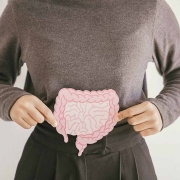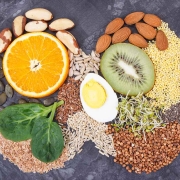6 Ways to Ease Your IBS Symptoms
Living with irritable bowel syndrome (IBS) is no picnic. The American College of Gastroenterology estimates that approximately 10-15% of the U.S. population has IBS. Despite the emotional and physical distress caused by bouts of cramping, diarrhea, constipation, gas, bloating, and abdominal pain, many people quietly suffer without a proper diagnosis.
Your IBS symptoms can improve with nutritional counseling and a specialized treatment plan that fits your unique health profile and lifestyle. While its specific causes are unknown, diet modifications can be very helpful in lowering the frequency and ease the severity of your symptoms.
Here Are 6 Ways to Ease Your IBS Symptoms
1. Check for microbial imbalances.
Unhealthy microbes or bacteria in the wrong place can be the root cause of IBS. It is estimated that up to 78%[1] of IBS patients have Small Intestine Bacterial Overgrowth or SIBO, a condition in which the type of bacteria normally found in the large intestine proliferates in the small intestine where it doesn’t belong. It can affect the absorption of nutrients and cause significant bloating and discomfort.
Pathogenic microorganisms anywhere in the gut can also cause IBS symptoms. At the Kaplan Center, our providers order specialized tests to find out the type and location of microorganisms in the intestinal tract. If we detect an overgrowth, we can treat it with prescription antibiotics, and antifungals or natural antimicrobials, such as oil of oregano and garlic extract.
2. Look for major triggers and irritants.
Gluten, corn, dairy, soy, eggs, peanuts, additives, and gums (such as carrageenan) can be major triggers. Other irritants, such as caffeine, alcohol, and NSAIDs such as ibuprofen, can worsen IBS symptoms. We’ll guide you through an elimination diet to identify your triggers and to ease and/or, in some cases, eliminate symptoms.
3. Eliminate high FODMAP foods.
Some healthy foods such as apples, watermelons, and broccoli can worsen IBS symptoms. FODMAPS, which stands for Fermentable Oligo-Di-Monosaccharides and Polyols, are types of carbohydrates that are osmotic and will pull water into the intestine. These foods may not be absorbed well and can be fermented by bacteria in your intestine, worsening IBS symptoms. Eliminate high FODMAP foods from your diet completely for 4 weeks. Re-introduce them one by one to narrow down the list of foods that cause your IBS symptoms to flare up.
4. Look for inflammation.
Our functional approach to treating symptoms means we’ll also look for signs of inflammation in the gut that may be exacerbating your symptoms. Our nutritionist can work with you to make sure you’re eating the right foods to reduce the occurrence of inflammation, thereby easing your IBS symptoms.
5. Digestive aids.
Sometimes acidity in the stomach needs to be stimulated and digestive enzymes need to be replaced. If foods are not broken down to a molecule small enough for absorption, it can affect digestive health. Natural antispasmodics such as peppermint oil can help with motility (the movements of the digestive system and the transit of the contents within it). Physical therapy and acupuncture can also be helpful for bowel function, especially constipation.
6. Introduce probiotics and nutrients.
Beneficial bacteria and certain nutrients are essential for healing the lining of the gut. At the Kaplan Center, we can formulate a variety of probiotics depending on your specific needs. Nutrients that are essential to gut health include zinc, L glutamine, aloe vera, DGL (Deglycyrrhizinated Licorice), and slippery elm.
If you are experiencing digestive symptoms, please give us a call us at 703-532-4892. We’re here to help you get to the root cause of your symptoms so healing can begin.
We are here for you, and we want to help.
Our goal is to return you to optimal health as soon as possible. To schedule an appointment please call: 703-532-4892 x2
[1] Ghoshal UC, Shukla R, Ghoshal U. Small Intestinal Bacterial Overgrowth and Irritable Bowel Syndrome: A Bridge between Functional Organic Dichotomy. Gut Liver. 2017 Mar 15;11(2):196-208. doi: 10.5009/gnl16126. PMID: 28274108; PMCID: PMC5347643.











Leave a Reply
Want to join the discussion?Feel free to contribute!